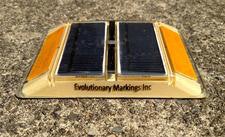 Solar markers are placed in Pocatello, Idaho, and will be installed around the state to illuminate dark areas for safety.
Solar markers are placed in Pocatello, Idaho, and will be installed around the state to illuminate dark areas for safety.The Idaho Department of Transportation is testing out new solar-powered LED raised pavement markers to try to improve safety on dark streets.
 Evolutionary Markings’ solar-powered LED pavement marker
Evolutionary Markings’ solar-powered LED pavement markerThe department purchased 600 of the raised markers, which store solar energy during the day and then automatically illuminate when the sun goes down, the Idaho DOT says. The first 100 markers were installed about a month ago to increase visibility around raised curb islands in the town of Pocatello in the southeast part of the state. The markers will eventually show up throughout the state as the DOT tests their effectiveness. Each of the state’s six DOT districts will receive 100 of the solar markers.
The DOT says so far it has received positive responses from drivers about the markers.
Here’s an Idaho DOT video of the markers in use:
Solar markers have been used sporadically in a handful states.
Florida is testing solar markers, with the FDOT placing them at dark, dangerous curves and on rural roads.
FDOT workers installed them in August in the center and outside lines on a one-mile stretch of St. Johns Avenue in Jacksonville at a cost of about $100,000, according to First Coast News.
Here’s a video of their intallation:
The FDOT announced recently that it is placing solar-powered markers at an intersection in rural St. Lucie County where two teens died in a wreck.
Kansas gave them a try on a 12-mile section of Interstate 135, according to a 2008 evaluation of products for the Federal Highway Administration and the Oregon Department of Transportation. The markers did not make a significant difference, the study said. However, the city of Carefree, Arizona, installed solar-powered pavement markers on a section of its main street where there had been several crashes, and no new crashes were recorded after a year of their installation, the study said.
The FHWA / ODOT study concluded that the devices needed more field testing and many did not meet reflective requirements.
The Iowa DOT bought its markers from Evolutionary Markings Inc., a Pocatello startup company, for $90 a piece, according to Government Technology. The company formed in 2014 and says its markers are designed to operate in extreme temperatures and can go for five days with low light. It says its markers are also compliant with the national Manual on Uniform Traffic Control Devices for LED lighted raised pavement markers.










